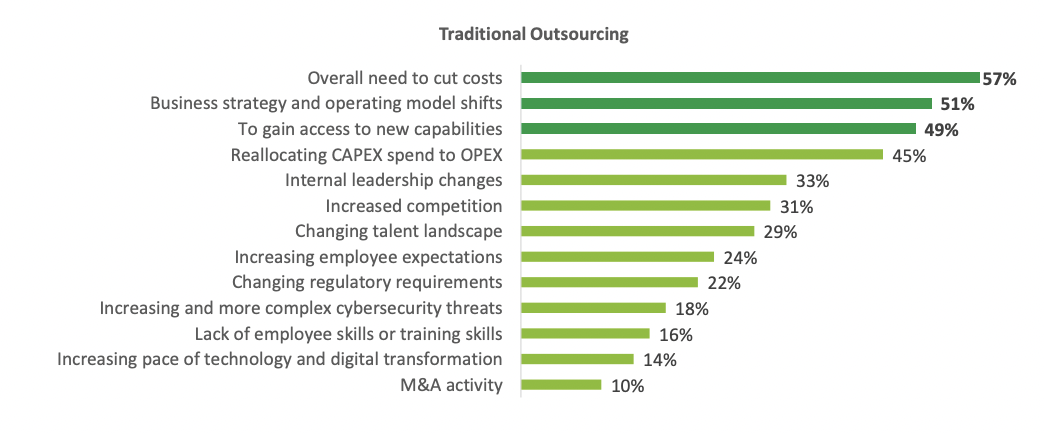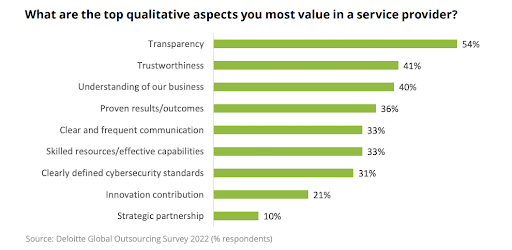Quick Summary: Do you need clarification on how to choose between outsourced or in-house for your software development? This article explores the advantages and disadvantages of in-house development vs outsourcing approaches in various business scenarios.
Do you need to upscale your business with the software development team? Are you wondering whether to hire another in-house developer or hire a remote developer? In such a situation, it becomes easier to make a decision with prior research. And we have done all the research for you!
In the coming year, software application development will remain the most outsourced IT function. The percentage of US businesses intending to outsource some of their software development remains consistent with last year, with 60% planning to do so.
Forrester Research has predicted that software growth will outpace pre-pandemic levels this year. Organizations are turning to outsourcing to fill gaps, drive value, and provide end-to-end solutions as they build a blueprint for the future.
The main difference between in-house development and outsourcing comes down to how you manage the team and handle costs. With outsourcing, you hire an external company or team, often from another location, to take care of your development needs while staying within your budget. On the other hand, an in-house team requires a long-term investment, with fixed costs like salaries and employee benefits.
Do you know a report by Global Newswire states that by 2026, the global IT outsourcing market will be worth $425.19 billion?
Outsourcing to countries like India allows you to deploy highly skilled resources on your project at almost ⅓ the price. With easy access to experts across the technology stack, outsourcing lets you ramp up your IT project & reduce time-to-market.
Key Takeaways
- In-house work provides greater control over quality, security, and confidentiality, but can be more expensive and limit the diversity of skill sets within the team.
- Outsourcing can be more cost-effective and provide access to specialized skills and resources but can pose risks to quality, security, and confidentiality, and create communication and coordination challenges.
- When deciding between in-house and outsourcing, companies should consider factors such as cost, quality, security, confidentiality, communication, coordination, and access to specialized skills and resources.
Finding, developing, and keeping the right talent with the right skills at the right price is more elusive than ever - Deloitte Global Outsourcing Survey
To help you decide whether your business needs to hire developers internally or outsource your software development needs, we have explained the pros and cons of outsourcing as well as building an in-house development team.
Let's help you make the right choice!
Quick Tabular Comparison of In-house Vs Outsourcing
- Features
- In-House Development
- Outsourcing Development
Resources
Limited and defined.
Supplementary resources because of specialty in such projects.
Technology
Limited range of technology with respect to specific projects.
Have more technology and tools for the project because the company has specialised in that sort of project.
Cost
More cost to hire domain and technology experts.
Less cost because of the availability of experts and geographical cost differences.
Expertise
Narrow range.
Wider range.
Speed
Slow and gradual.
Fast and progressive.
Quality
Can compromise on quality.
No compromise on quality.
Flexibility
Rigid & less flexible because of local control and strict environment.
More flexible because of having more expertise in the project.
Legal Compliance
Less legal compliance because of the domestic market and local laws.
More legal compliances because of geographical variations in laws and regulations.
In-House Software Development
Adding full-time employees to your business is known as in-house hiring. In-house hiring requires you to go through the complete hiring process. This can take weeks, even months, before you have an entire team ready for your development project.
So it makes sense to hire internally if your firm is solely focused on IT products and needs resources for long-term engagement. Companies like Amazon and PayPal hire in-house developers, giving them control over the project at a higher cost.
Pros and Cons of Managing Projects In-House
There are so many good reasons to leverage the talent that you already have. But your team might not be a perfect fit for everything. Consider these pros and cons of in-house project development.
Pros of In-house Development
1. Talent Development
If you need some domain expertise, you can easily upgrade their skills according to their needs whenever required without going outside and searching for new talent. It is difficult when you are outsourcing a team from outside.
Even if you do, you will have to invest more money than what you are already paying to the in-house team to upgrade their skills. A lack of skill set reflects in the product quality later.
2. On-site Availability
Being able to connect helps to work effectively and reduce any misunderstandings. As the team works together within the same office and time zone, it's easy to get the changes done more quickly. With an in-house team, one can leverage several benefits, such as;
- Long term association
- 100% visibility of work
- IP and Data protection
- Same work timezone
- Better communication
Cons of In-house Development:
If you are considering setting up an in-house team to develop your software product, be ready to deal with any of these possible challenges.
1. High-cost
The cost to hire developers in-house is significantly higher than offshore developers. It's simply because this cost includes the infrastructure, overhead salaries, other employee benefits, training costs, etc.
2. Lack of Necessary Skills
It is impossible to have an in-house team with all the skillsets and experience. Different individuals have distinct areas of expertise. So, as per your project requirements, you will have to hire someone with expertise in your domain.
And this is where hiring outsourced developers come in, as they have an elaborate team with specialists across the technology stack who can be hired on a need basis.
3. Low Retention Rate
Due to the higher demand and luring packages offered by other companies, programmers in Western and European countries keep switching jobs more frequently. Thus, there's always a risk that your lead developer may switch jobs during the crucial phase of the project. Additionally, long hiring cycles are another concern that can create unnecessary delays in project development.
Recommended Read: All-In-One Guide to Software Development Outsourcing
Outsourcing Software Development
Recommended Read: IT Outsourcing Trends that Will Rule in 2023
Pros and Cons of Outsourcing
You have an in-house team to get things done. If you already have an experienced team of engineers, why would you choose to outsource software development?
There are several benefits to building an in-house team of developers, but your team might not be suited for every project. This is where the role of outsourcing comes into play.
Let’s discover the pros and cons of outsourcing software development.
Pros of Outsourcing:
Let's look at what you gain with the outsourcing team:
1. Cost-Effective
One of the most significant advantages of hiring a dedicated outsourcing team is saving a considerable amount of money. Hiring an outsourcing partner lets you cut hiring costs, onboard specialists at competitive pricing, save big on infrastructure, or invest in large workspaces and resources.
You pay the pre-defined rate per hour or total amount for the entire project as per the mutual agreement. Further, you do not need to pay salaries when the project has been completed and the team is idle. It is the responsibility of the outsourced company to cover all the engineer expenses, such as the offshore development center and work resources.
2. Short-term Commitment
It is the most underrated benefit of outsourcing. Bringing an expert on board without long-term commitments is a great advantage.
As mentioned earlier, outsourcing allows you to hire developers based on three engagement models:
Just to give you a heads-up, here are the resources you might need to build a software, website, or mobile app.
- Team of designers and developers
- Project Manager
- Infrastructure (Hardware and Software)
With outsourcing, you can hire these resources separately or build an offshore development center and make it an extension of your in-house team or company.
3. Core Competencies
According to Deloitte’s 2022 global outsourcing survey report, outsourcing allows businesses to focus on their core competencies and business growth. When you hire an offshore development team, you allow your internal team to focus on other project requirements entirely.
Leveraging outsourcing development services enable you to reassign time-consuming tasks to the external team. Your team can also receive a third-party opinion of your software by outsourcing. As a result, you will be able to make more robust decisions for your core business initiatives.
4. Risk Mitigation
Leveraging offshore development services enables businesses to mitigate risks involved in a software development lifecycle, such as operational risk, schedule risk, and technical.
Collaborating with an outsourcing partner means you can efficiently decrease the risk percentage since they are experienced in handling complex projects.
A legal contract always binds outsourcing. It includes the scope of work, NDA (Non-Disclosure Agreement), and other vital aspects like payment, time, performance, and confidentiality.
5. Quick Team Change
If you are not satisfied with the dedicated teamwork, you will quickly get an immediate resource replacement. Many offshore providers offer a replacement within a week from the existing resource pool. However, if the client wants to hire a new developer, your outsource IT services partner will fill in occupancy at the earliest but within a pre-defined period.
With in-house specialists, it's quite complicated.

Also read: 2022’s Checklist To Hire Offshore Development Team
Cons of Outsourcing
While building an offshore software development team that offers several benefits, there are its downsides as well. Most of these problems are caused by distance or communication.
1. Lack of Control
It is the most reported concern where companies lose the project's traction. This may happen due to the lack of project understanding by the offshore team. In the comparison of In-House development vs Outsourcing, this particular point will always be in favor of the former.
But you can avoid this issue by documenting all your requirements, creating milestones, and project charter. This way, you can keep track of the work. In case things go wrong, it will help you to find out the whereabouts of the same quickly. Further, offshore development centers provide you with a team that will work directly under your supervision, providing you with 100% visibility of ongoing operations at all times.
2. Lack of Communication
No matter what the deal, it is always recommended to keep a single point of contact for all your communications. Communicating with an on-site team is far easier than the offshore team.
In the case of offshore development, communication becomes a bit complicated. The issues may arise if your team is in an entirely different time zone. Plus, reliable internet connection and quality are a few more concerns. If you are not getting the expected quality, then what's the benefit of outsourcing?
But again, it's easy to avoid these issues by collaborating with a reliable outsourcing partner and finalizing the right communication channels along with meeting times.
3. Data Security
Data security means protecting confidential and sensitive data and infrastructure from malware attacks. Failure to put data security in place leads to data vulnerability, resulting in a breach of information, leakage, or deletion of critical data.
A Detailed In-House vs Outsourcing Cost Comparison

In-House development challenges addressed by outsourcing
|
In-House Challenges |
Outsourcing Solutions |
|
Hidden and unpredictable expenses A bundle of unexpected costs have to bear, such as purchasing new hardware for specific projects, maintenance, management and gradation costs |
Expected and predictable expenses Can save thousands as less maintenance, gradation, and management costs are required. |
|
Staffing and Training In the case of specialized and complex projects home organization doesn’t have enough expertise and workers available, so it has to conduct project-based hiring and training |
No Project based Hiring and Training required Specialized outsourcing organizations already have experts available, so they don’t have to do hiring. Hence can quickly fly the project toward completion. |
|
Maintenance overhead Maintenance of projects is a highly complex task and generally requires a lot of time and cost to be done in-house. Again have to hire experts for the maintenance. |
Better and World Class Services As the outsourcing organization specializes in that sort of project, so requires less time and cost to do maintenance |
|
Lack of up-to-date Technology and Tools In the case of specialized and complex projects, generally, home organizations don’t have enough technology and Tools available |
up-to-date Technology and Tools The best and latest tools and technology available are available to specialized outsourced organizations. |
|
Capital Expense This may occur due to the purchase of new hardware and software. |
No Special Capital Expense Hardware and software are already available to specialized outsourcing organizations. |
|
Retention and Training required Expert workers' turnover rate is generally high, so they have to hire and train new employees. |
No Retention and Training required Skilled IT Experts available to accomplish the projects because of the very less retention rate. |
Best Practices to Mitigate the Above Shared Challenges of Outsourcing
- Establish direct communication channels
- Keep track of reporting and documentation
- Be aware of cultural differences
- Consistently execute comprehensive research before deciding on a vendor
- Clearly describe the duration, requirements, and costs of the project
- Make sure you understand the risks and find the company that you trust.
- Place resilient security protocols in place to eliminate data leaks and security breaches.
Recommended Read: How to Hire Developers for Startup - Ultimate Hiring Guide
Why do Companies Choose to Outsource Work?
Most companies choose to outsource work because offshore companies offer cost-effective and reliable software solutions that ensure their team will work around the clock to meet your business objectives at very cost-effective prices.

1. Increase Profitability
Hiring an outsourced team to assist with software development services improves efficiency, quick time-to-market, and high quality while keeping costs to a minimum. You may be thinking, 'how does employ more people equate to savings?' and the answer is simple.
Offshore development centers are usually located in countries with low wages. They provide technology specialists that may be limited in your local geography. Therefore, outsourcing enables businesses to increase their workforce at a much lower cost than hiring locally.
Overall, service centers don't just provide all the critical resources; they build and nurture a positive working culture with dedication. A culture where staff is self-motivated to learn is more likely to release high-quality software solutions, leading to a positive return on investment.
2. Facilitate Growth
According to the Investopedia findings, the U.S Bureau of Labor Statistics states that 45% of new businesses fail during the first five years and 65% during the first ten years. These initial five years are arguably the most challenging and crucial of any organization's life cycle as ventures risk scaling rapidly.
For example, according to the McKinsey findings, an IT company growing at an annual rate of 20% still has a 92% chance of failure.
What should be the solution then to achieve faster growth? In a competitive landscape, business success depends on infrastructure and people to promote, maintain, and support growth.
Outsourcing is a quick solution to speed up hiring and training processes and develops teams ready to contribute to organizations' growth in a short time. Fast growth comes with the quick acquisition of talent, one of the critical capabilities of outsourcing service providers.
3. Access to Global Talent
In an age of mobility, outsourcing enables businesses to hire offshore developers from across the globe with diverse domain knowledge, all centralized in hub cities. Such a diverse team offers a broader pool of talent that can support numerous languages, and enterprises have access to local understanding of specific markets.
Eventually, businesses don't need to deal with hiring bottlenecks. The outsourcing company helps find and pair the right team of developers.
4. Fastest Project Delivery
Offshore companies place a framework of the Scrum and Agile approaches and set the necessary priorities to meet the organizational business goals. This significantly reduces the Time-to-market and ensures timely delivery to the end users.
In-House vs Outsourcing: What Should You Choose?
Hiring an In-house team might seem easy at first glance, but it has some real challenges. For example, recruiting the right candidate and investing in training and development can be daunting and costly at every stage.
So can your business benefit from hiring an outsourcing team? Choosing the best option is only possible through self-assessment of the situation. Outsourcing reduces most of the workload from planning to execution, allowing you to put your efforts into the tasks that require your attention.
If you are still unsure about which option to choose for your project, don’t hesitate to contact us for a free consultation. We will help you determine which In House vs. outsourcing software development option suits your overall business needs.






![Programming Outsourcing [Guide]: Everything You Need to Know](https://www.yourteaminindia.com/hs-fs/hubfs/In%20depth%20guide%20to%20Programming%20Outsourcing.png?width=352&name=In%20depth%20guide%20to%20Programming%20Outsourcing.png)


